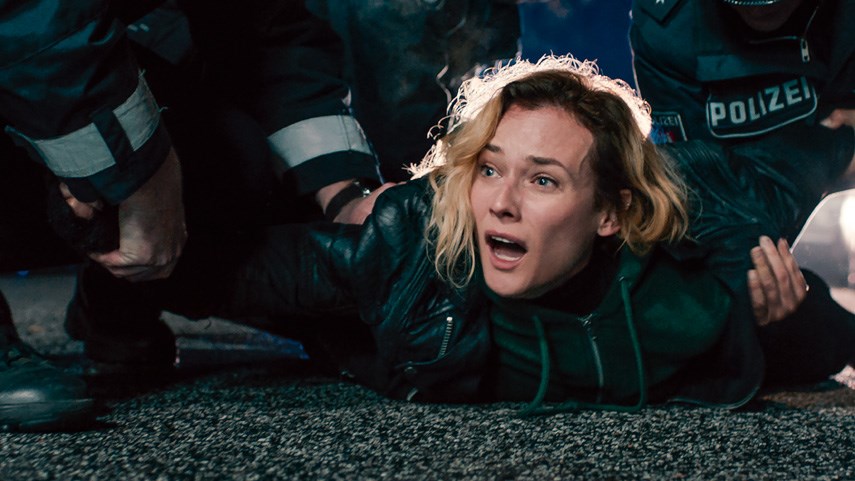In The Fade. Directed by Fatih Akin. Starring Diane Kruger, Denis Moschitto and Numan Acar. Rating: 7 (out of 10)
The upswing in Nationalist sympathy and homegrown terrorism are framed by a mother’s grief and quest for vengeance in Fatih Akin’s In The Fade.
Diane Kruger won the Best Actress Palme d’Or for her wrenching portrayal of Katja, a woman who loses her husband and young son in a terrorist attack, only to be subjected to fresh horrors in the ensuing court battle and its aftermath.
The bombing at husband Nuri’s (Numan Acar) office is initially investigated as having a political motive – was he Muslim? Did he fundraise for extremist groups? – and when that theory proves untenable, investigators move on to Nuri’s drug-dealing past (Turkish mobsters or Albanian mafia perhaps?). Katja remembers a passer-by on the street and is convinced the blast was caused by Nazis.
It’s every mother’s nightmare. Worse, actually, since Katja has to hand over toothbrushes from home before the authorities can ID the bodies. (“They are no longer people, just body parts,” an inspector devoid of bedside manner offers.)
Katja’s own mother suspects something illegal; her in-laws demand the bodies be taken back to their native Turkey, then blame her for her husband and son’s deaths. A pregnant friend (Samia Chancrin) takes Katja casket shopping and then retreats, leaving her very much alone.
The film is nearly over a quarter of the way in when an extraordinary bathtub scene all but swallows our heroine, who is saved by old-school voicemail.
The next chapter tells about the search for justice in a very sterile courtroom, complete with stark white tiles and walls and screeching chairs. Family friend Danilo (Denis Moschitto) prosecutes while two defendants stare straight ahead, unmoved by the horrors recounted by the coroner and impervious to Katja’s agony. Things unspool here, with a defense lawyer seemingly made out of leftover Bond villains (Johannes Krisch, lengthy and antagonistic courtroom speeches, and the fact that Katja can share a cigarette break with a key witness and not be molested by the German media. (Great scene, by the way.)
The chapters are interspersed with footage of the little family – Katja, Nuri, and six-year-old Rocco (Rafael Santana) – playing at the beach and working on projects at home, the better to add to the depth of Katja’s grief.
The multiplex is full of suffering mothers at the moment: Rosamund Pike in Hostiles, Michelle Williams in All The Money In The World, Three Billboards Outside Ebbing Missouri’s Frances McDormand. Katja’s emotional rawness is palpable, and Kruger’s Palme d’Or much deserved (her first feature in her native German, no less). But this portrait of grief and loss of identity (I was a mother/am I still a mother?) turns into a thriller, chase movie and revenge fantasy in the last third that squanders some of the lustre that the film Akin started with.
Writer-director Fatih Akin was inspired by a spate of neo-Nazi-perpetrated murders in the early 2000s in Germany, and an Amnesty International report released in 2016 said that racist violent crimes in Germany against racial, ethnic and religious minorities were up 87 per cent between 2013 and 2015. Despite meandering off course, Akin’s film feels gut-wrenchingly current.



